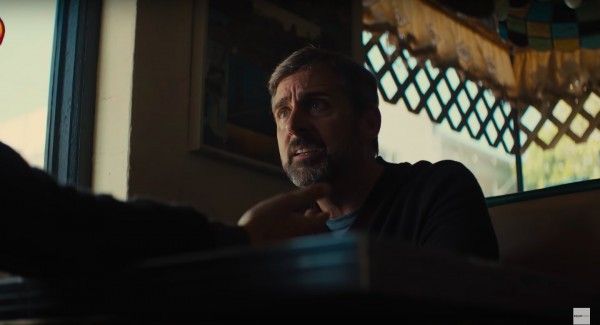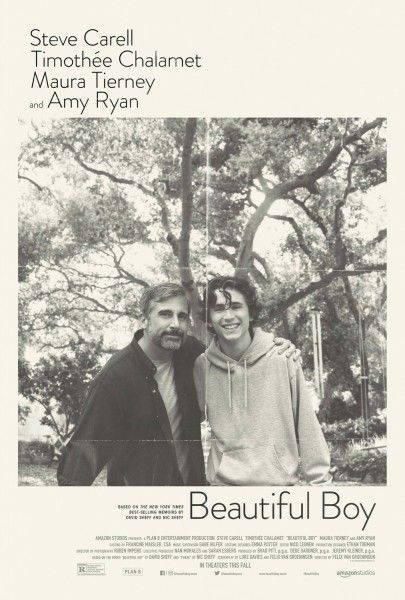[This is a repost of my review from the 2018 Toronto International Film Festival. Beautiful Boy opens today in limited release.]
The biggest tragedy of Beautiful Boy is that it will probably become painfully relevant to the lives of more and more people as the opioid crisis continues to spin out of control with no end in sight. Approximately 72,000 Americans died from opioids last year, and yet it’s an epidemic we refuse to deal with. Felix Van Groeningen’s movie isn’t about the opioid crisis on a macro level, but telling just one story—that of David Sheff and his son Nic. The movie operates on the best of intentions, and finds some deeply emotional moments with a father who can’t save his son and a son struggling to save himself. There is no “why” to addiction that can be solved, and you can’t out-think or outwit it. The result is that you get stuck, and so does Beautiful Boy despite Van Groeningen’s valiant efforts to find unique angles on the story.
Based on the memoirs by David Sheff (Steve Carell) and his son Nic Sheff (Timothee Chalamet), the story explores Nic’s struggle with addiction and the inability of David to help his son despite his best efforts. The movie shows how “relapse is a part of recovery” as Nic will kick his habit for months at a time but eventually start using drugs, particularly crystal meth, again. Eventually, David must reckon with the possibility that Nic is beyond saving.
To Van Groeningen’s great credit, he doesn’t simply make Beautiful Boy a nonstop parade of tragedy. This isn’t Requiem for a Dream. He finds a range of emotions, not just in David and Nic’s past before Nic was consumed by addiction, but in Nic’s cycle of addiction. This commitment to a range of emotions makes Beautiful Boy feel far more honest than if Nic just kept breaking his father’s heart. There are times when Nic is on the upswing and there are times when something unintentionally funny can happen like David throwing his phone in anger and then searching the bushes for his lost phone. Addiction transforms and shatters lives, but it doesn’t turn people into PSA characters.
The film is also wise to draw from both David and Nic’s memoirs so that neither one owns the perspective on the movie. We can sympathize with both characters, and while it’s obviously easily to sympathize with David—a father who slowly comes to realize he’s unable to save his son no matter how hard he tries—we also sympathize with Nic on the level that there’s no easy answer for addiction. He didn’t have an abusive upbringing. He was raised in relative comfort. But addiction crept into his life, and at that point, the why of it kind of goes out the window. The film shows that there are no easy answers and that simply going to rehab or going to meetings or going to detox is not a cure-all, and that every day is a battle.
Both Carell and Chalamet are outstanding in their respective roles. Carell puts his everyman talents to their best use by making David, despite his personal accomplishments, just a regular father. He’s a father with perhaps more means than others, but he’s defined by his love for his son, and yet addiction shows that his love may not be enough. As for Chalamet, he continues to be one of the most exciting young actors working today. He plays Nic not like a caricature of an addict, but someone with a unique history and specific personality that’s being drowned by his drug habit.
However, Beautiful Boy eventually falls prey to the same kind of stagnation its characters experience. It’s a movie about characters who are stuck and can’t move forward because of addiction, so the movie itself can’t move forward. We’re in the muck with David and Nic, and while our heart breaks for them, we also don’t have any answers. So we’re witnessing Nic play out the same cycle of relapse and recovery, and the movie loses momentum despite loading up on far more needledrops than any film requires. The loss of momentum also puts Van Groeningen in a bit of a quandary since he wants to be honest to the struggles of addiction, but that addiction stunts the progression of his movie because there’s not much progress to be made. It is tragedy without catharsis.
Beautiful Boy may not be a “great” film that will have everyone talking or win all the accolades, and yet it also feels like one of the most essential films that could exist right now. While the film lacks narrative momentum, its heart is in the right place, and that’s to show the havoc addiction wreaks on families and how those families have no answer for addiction. The larger tragedy isn’t what happened with the Sheffs, but that it’s potentially waiting for all of us. There’s nothing isolated about Nic Sheff. He could have been one of the 72,000 who died last year. What Beautiful Boy hammers home in its own way is that addiction is a disease with no known cure and no easy answers. People may not want to hear that, but they need to.
Rating: B-



